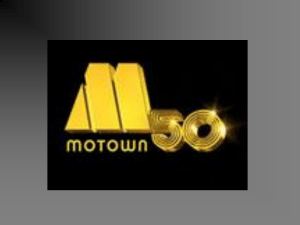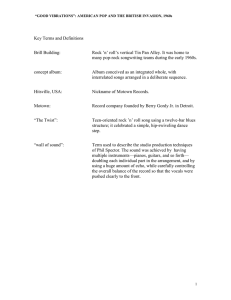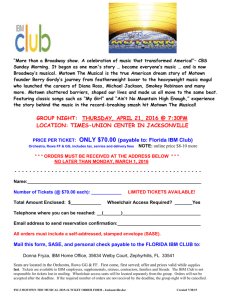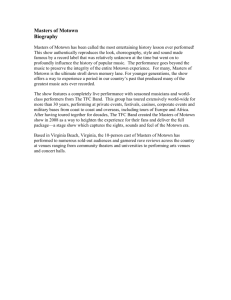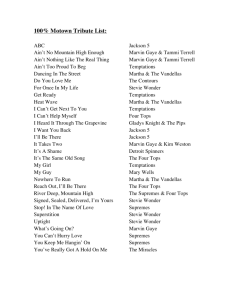MUSIC 351. The Music of Motown
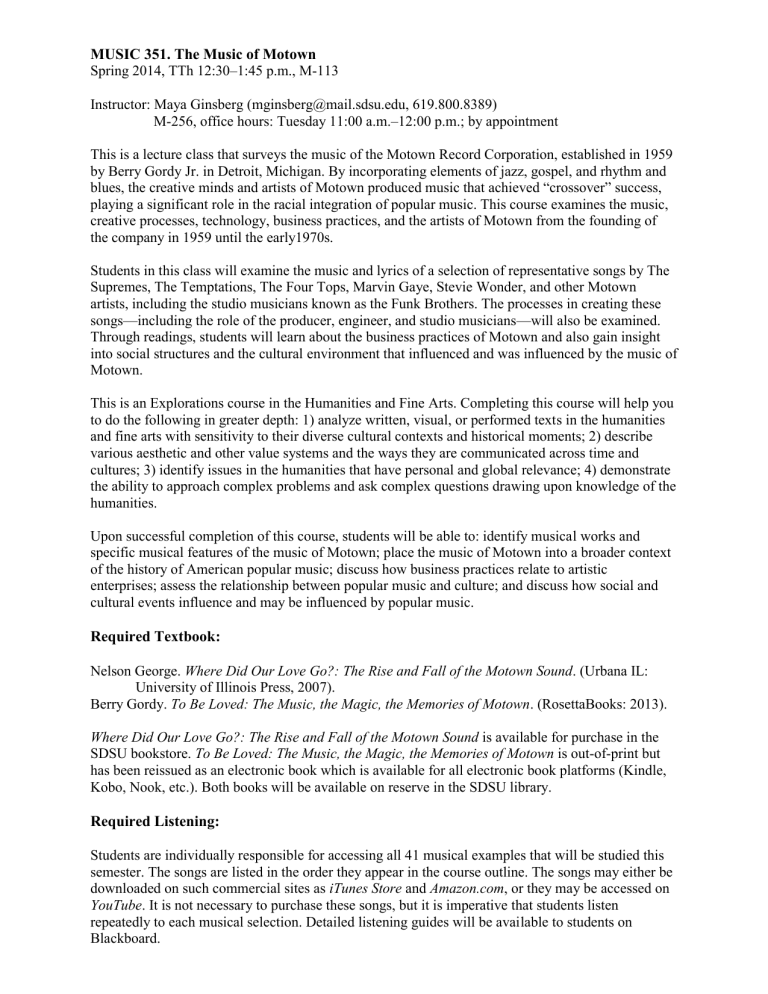
MUSIC 351. The Music of Motown
Spring 2014, TTh 12:30–1:45 p.m., M-113
Instructor: Maya Ginsberg (mginsberg@mail.sdsu.edu, 619.800.8389)
M-256, office hours: Tuesday 11:00 a.m.–12:00 p.m.; by appointment
This is a lecture class that surveys the music of the Motown Record Corporation, established in 1959 by Berry Gordy Jr. in Detroit, Michigan. By incorporating elements of jazz, gospel, and rhythm and blues, the creative minds and artists of Motown produced music that achieved “crossover” success, playing a significant role in the racial integration of popular music. This course examines the music, creative processes, technology, business practices, and the artists of Motown from the founding of the company in 1959 until the early1970s.
Students in this class will examine the music and lyrics of a selection of representative songs by The
Supremes, The Temptations, The Four Tops, Marvin Gaye, Stevie Wonder, and other Motown artists, including the studio musicians known as the Funk Brothers. The processes in creating these songs—including the role of the producer, engineer, and studio musicians—will also be examined.
Through readings, students will learn about the business practices of Motown and also gain insight into social structures and the cultural environment that influenced and was influenced by the music of
Motown.
This is an Explorations course in the Humanities and Fine Arts. Completing this course will help you to do the following in greater depth: 1) analyze written, visual, or performed texts in the humanities and fine arts with sensitivity to their diverse cultural contexts and historical moments; 2) describe various aesthetic and other value systems and the ways they are communicated across time and cultures; 3) identify issues in the humanities that have personal and global relevance; 4) demonstrate the ability to approach complex problems and ask complex questions drawing upon knowledge of the humanities.
Upon successful completion of this course, students will be able to: identify musical works and specific musical features of the music of Motown; place the music of Motown into a broader context of the history of American popular music; discuss how business practices relate to artistic enterprises; assess the relationship between popular music and culture; and discuss how social and cultural events influence and may be influenced by popular music.
Required Textbook:
Nelson George. Where Did Our Love Go?: The Rise and Fall of the Motown Sound . (Urbana IL:
University of Illinois Press, 2007).
Berry Gordy. To Be Loved: The Music, the Magic, the Memories of Motown . (RosettaBooks: 2013).
Where Did Our Love Go?: The Rise and Fall of the Motown Sound is available for purchase in the
SDSU bookstore. To Be Loved: The Music, the Magic, the Memories of Motown is out-of-print but has been reissued as an electronic book which is available for all electronic book platforms (Kindle,
Kobo, Nook, etc.). Both books will be available on reserve in the SDSU library.
Required Listening:
Students are individually responsible for accessing all 41 musical examples that will be studied this semester. The songs are listed in the order they appear in the course outline. The songs may either be downloaded on such commercial sites as iTunes Store and Amazon.com
, or they may be accessed on
YouTube . It is not necessary to purchase these songs, but it is imperative that students listen repeatedly to each musical selection. Detailed listening guides will be available to students on
Blackboard.
MUSIC OF MOTOWN LISTENING LIST
1.
The Satintones, “Motor City” (1959)
2.
The Swinging Tigers, “Snake Walk (Parts 1 & 2)” (1959)
3.
Barrett Strong, “Money (That’s What I Want)” (1959)
4.
Marv Johnson, “Come to Me” (1959)
5.
Eddie Holland, “Jamie” (1961)
6.
The Marvelettes, “Please Mr. Postman” (1961)
7.
The Miracles, “Shop Around” (1960)
8.
The Miracles, “You’ve Really Got a Hold on Me” (1962)
9.
Mary Wells, “My Guy” (1964)
10.
The Contours, “Do You Love Me” (1962)
11.
Junior Walker and the All Stars, “Shotgun” (1965)
12.
The Mynah Birds, “It’s My Time” (1966)
13.
Martha and the Vandellas, “Dancing in the Street” (1964)
14.
The Temptations, “The Way You Do the Things You Do” (1964)
15.
Little Stevie Wonder, “Fingertips (Part 2)” (1963)
16.
The Temptations, “My Girl” (1964)
17.
The Supremes, “Where Did Our Love Go” (1964)
18.
The Supremes, “Stop! In the Name of Love” (1965)
19.
The Four Tops, “I Can’t Help Myself (Sugar Pie Honey Bunch)” (1965)
20.
The Four Tops, “Standing in the Shadows of Love” (1966)
21.
Marvin Gaye and Tammi Terrell, “Ain’t No Mountain High Enough” (1967)
22.
Marvin Gaye and Tammi Terrell, “You’re All I Need to Get By” (1968)
23.
Gladys Knight and the Pips, “I Heard it Through the Grapevine” (1967)
24.
Marvin Gaye, “I Heard it Through the Grapevine” (1968)
25.
Jackson 5, “I Want You Back” (1969)
26.
Jackson 5, “ABC” (1970)
27.
The Temptations, “Cloud Nine” (1968)
28.
The Temptations, “Ball of Confusion (That's What the World Is Today)” (1970)
29.
The Undisputed Truth, “Smiling Faces Sometimes” (1971)
30.
The Temptations, “Papa Was a Rollin’ Stone” (1972)
31.
Diana Ross and the Supremes, “Love Child” (1968)
32.
Edwin Starr, “War” (1970)
33.
Marvin Gaye, “What’s Going On” (1971)
34.
Marvin Gaye, “Mercy Mercy Me (The Ecology)” (1971)
35.
Marvin Gaye, “Inner City Blues (Make Me Wanna Holler)” (1971)
36.
Stevie Wonder, “Superstition” (1972)
37.
Stevie Wonder, “Living for the City” (1973)
38.
Stevie Wonder, “You Haven’t Done Nothin’” (1974)
39.
Marvin Gaye, “Let’s Get it On” (1973)
40.
The Commodores, “Brick House” (1977)
41.
Rick James, “Super Freak” (1981)
Class Website:
Students may consult a website specifically designed for this course on Blackboard (the University’s online network of class websites) from any computer with internet access. The address is: https://blackboard.sdsu.edu
. The site includes copies of the syllabus and course outline, handouts, listening guides, supplemental reading, review sheets for exams, discussion boards, and quizzes.
Grades for quizzes, discussion, and exams will be posted on Blackboard. Please direct any questions about grades to the instructor in a timely manner.
Evaluation:
Quizzes (10 @ 50 pts.): 500 pts.
Over the course of the semester, students will be required to take ten quizzes, each comprised of multiple-choice, true-false, and/or listening identification questions concerning issues and music discussed in class the previous week. The quizzes, which will be administered on Blackboard, must be completed before the class period listed in the course outline. The due dates for the quizzes are listed in the class outline. Any issues with the quizzes regarding technology need to be addressed in a timely manner.
Midterm and Final Examination (2 @ 200 pts.): 400 pts.
The exams will consist of multiple-choice and/or true-false questions requiring students to identify key terms and people, identify a musical selection of songs studied in class, respond to statements concerning musical features of each listening excerpt, and address main issues associated with the lectures and assigned readings. Exam dates and times can be found on the course outline. You must be present on these dates unless you are prevented by a verified illness or emergency.
Discussion Groups (4 @ 25 pts.): 100 pts.
At four points during the semester, as indicated in the course outline, students will form groups to discuss issues concerning musical or cultural principles of the music of Motown from the lectures and readings. Attendance is critical and mandatory for these discussion groups and each group will submit a written summary of their discussion.
Grading Scale
A 930–1000
A- 900–929
B+ 870–899
B 830–869
B- 800–829
C+ 770–799
C 730–769
C- 700–729
D+ 670–699
D 630–669
D- 600–629
F 0–599
Use of Electronics in Class:
Please limit the use of computers and/or tablets during class to work being done in class—note taking, accessing your text, etc. The use of cell phones (texting, talking) is strictly prohibited during class meetings.
Student Disability Services:
Students requesting academic accommodations based on a disability must register with
Student Disability Services ( http://www.sa.sdsu.edu/sds/index.html
) who will issue a verification letter. SDS is located in Calpulli Center, Suite 3101, and is open from 8:00 a.m. to 4:30 p.m., Mon-
Fri; (619) 594-6473. If you are a student with a disability and believe you will need accommodations for this class, it is your responsibility to contact SDS. To avoid any delay in the receipt of your accommodations, you should contact Student Disability Services as soon as possible. Please note that accommodations are not retroactive, and that I cannot provide accommodations based upon disability until I have received an accommodation letter from Student Disability Services.
